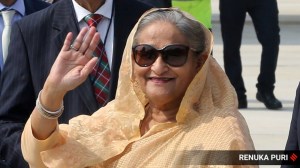The Kapoor Daughter Show
She is a woman for the times and also shaped by the times. Everyone is talking about her. The woman who has shown that she can achieve the i...

She is a woman for the times and also shaped by the times. Everyone is talking about her. The woman who has shown that she can achieve the impossible. The media is all agog. Every little gesture she makes is reported. So also any little phrase she utters. Just the woman the next century is waiting for. She is none other than Prithvi Theatre’s own whiz kid — Sanjana Kapoor.
On her slim shoulders lies the burden of a rather heavy legacy: the dreams of her grandfather which could not be realised. The passion which her mother felt for theatre. The prestige of her father whose idea it was to revive Prithvi. But who really couldn’t quite do it. The mantle fell finally on the third generation. The lovely girl who was considered wayward proved herself willful. And this year, as the theatre built by Papa Shashi Kapoor and Mama Jennifer Kendall steps into its 21st year, Sanjana is finally in complete control and victorious, of course.
And her domain is not just Mumbai with its little theatre at Juhu. She hasconquered the Capital as well with Festival ’98. The spot she chose for the festival of Theatre of Europe’, as it is called, couldn’t have been better. The India Habitat Centre, which is the place to be seen at and which spells the way art must go in the years to come. Ample sponsorship was arranged. The right kind of pre-publicity followed. The right kind of packaging too. What followed was panic buying of tickets, for this was something which just could not be missed. How ignorant would one seem to not be able to talk about the Prithvi Festival at the Fall cocktail circuit.
What makes her own persona all the more exciting is the fact that she has not succumbed to the temptation of talking about herself. That would be passe. She keeps herself draped in mystery. Not like the cold Sphinx that Italian Sonia Gandhi came to be known as. But with all the charm that comes of her Indo-Anglian parentage. So the Sanjana, who comes forth today, is utterly butterly delicious — so like The Amul India Show sheanchors for Star TV. Why talk of the past? Only those who have no future do so. Both Sanjana and Prithvi have a bright future to look forward to.
Of course, there is much about this Kapoor girl which is all too well-known. The only daughter of Jennifer and Shashi was born to theatre. The Kapoors with Prithvi Theatre on one side and the Kendalls with Shakespearana on the other. And if she put up posters at Prithvi and played waitress at the famous cafe of the theatre, she also toured with the Kendalls. And in doing so, she decided what must not be done in theatre. That which is tedious and quite unrewarding really. Making the Bard of Avon a mission and travelling from school to college for very little money was not much. And doing socially-committed theatre for the masses in Hindi was, of course, blasphemy. See, where it led Prithvi Papajee. It means the very closure of theatre. Why, for that matter, get into acting, direction or production at all? There are enough doing that kind of thing and emerging nobetter for it. What theatre groups needed was a manager of the kind Indian theatre had never seen before and here Sanjana proved herself most capable. Even Uncle Ismail Merchant bows before her “sensuous seduction” when it comes to getting money and sponsorship for her beloved Prithvi Theatre.
The magic has not been worked in a day. She has worked at it diligently for nine long years. She has been very quick at learning from a mistake and making sure that it is never repeated. Not that Sanjana did not have her share of rebellion. In her teens she gave her parents many a sleepless night. Didn’t a women’s magazine feature her in a story called Diary of a Defiant Daughter’. But all that seems very far away and forgotten. So is a short-lived marriage to Bimal Roy’s grandson. Even her flop shows at trying to make it on the Hindi screen, including the glamour girl she played opposite Naseeruddin Shah in the box office disaster called Hero Hiralal, belong to another time.
What matters is the present.The past should be mentioned only if it has the right emotional appeal. So we have Sanjana repeating the catchline to one media person after another: “Prithvi was my grandfather’s dream and my father’s idea.” It goes straight to the heart. See the girl is fulfilling the patriarchal dreams even when her brothers have gone their own way. The mighty Prithviraj is remembered now by most as the Akbar of Mughal-e-Azam. Few remember his four-act play called Paisa which highlighted the false power of money. There are very few left to recall what his dreams for Prithvi were. But to see the magic Sanjana has worked one must go back to Bunny Reuben’s portrait of the grand old man, Prithviraj: the papajee of Hindi stage and screen. Sitting in Janaki Kutir, which now houses Prithvi Theatre, on a September day of 1970, Papajee told Reuben, “I shall now turn towards rural theatre. I will tour all over India, in her villages, staging plays. I shall address the audience in each region in their ownlanguage, but I shall stage the plays in the national language, Hindi.”
If there had been a poet like Mamta Kalia in Sanjana, she would have said, “Three donkey claps to you Papajee and four more to the Hindi language.” But she chooses to remain silent and realise the dreams of her forefathers the way they can be best realised in these times. As for Hindi, Prithvi Theatre has done its bit for it. Now the playwright award, which she proposes to introduce at Prithvi Theatre, will be for plays only in English. “The playwright will have to write the play in English, produce it and stage 10 shows in Mumbai to be eligible for the award,” says Sanjana. For she understands well the language of the era of globalisation.
Now that she has shown what it takes to revive Prithvi Theatre, there are any number of small-time theatre actors and directors saying that Prithvi Theatre under Sanjana is a mere hiring place or a a festival organising institution, taking readymade material and projecting it. What aboutcreativity or social commitment? Savvy Sanjana shrugs them off and if Papa Shashi is silly enough to suggest a full-fledged repertory, she chides him lovingly as a dreamer and is quick to tell the media that such a proposition is “unviable”. Let the failures of the world say what they want. They are jealous, plain and simple.





- 01
- 02
- 03
- 04
- 05


























